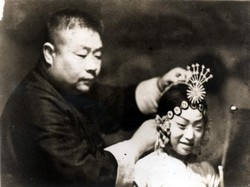
The famous tang actress, Zheng-Qiu Koo, influenced the development of Chinese opera on Taiwan.
Ever since Chinese opera transmitted to Taiwan from Qing Dynasty, it has been over 100 years.The development of Chinese opera on Taiwan could be traced to Japanese ruled period.At that time, due to geographic and transportation convenience factors, Shanghai Chinese opera groups often came to Taiwan for performance, and became the entertainment mainstream of Taiwan commercial theater.And the China-Japan War explored, Japanese government promoted Japanese Citizen Movement on Taiwan, forbid opera performance.Until the end of the War, Civil War occurred, plenty KMT military came to Taiwan, and the Chinese opera groups came afterwards.Due to the delicacy and subtlty of Chinese opera art development that became mimic and learning subject of other operas.It has great influence on the development of Taiwanese Pei Kuan and Taiwanese opera, even Hakka opera. As to the development process of Chinese opera on Taiwan for the past 50 years, it can be introduced as four period of time:
I. Foundation Period (1950’s)
The foundation of Chinese opera on Taiwan can be reviewed from four levels:
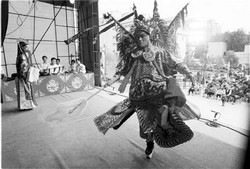
In 1995, thye three military opera groups: Hei Guang, Da Peng, and Lu Guang, went into history.
A. Although Chinese opera company came to Taiwan in the early days were popular here, but in terms of the length of performance and the trimming of artistic standard, the “Koo’s Opera Company” of Zheng-Qiu Koo was still considered as the foundation of Chinese opera on Taiwan.The Koo’s Opera Company came to Taiwan for one-month performance by the end of 1948, but due to warm reactions from the audience, they decided to prolong the performance and the whole group stayed in Taiwan.Due to Zheng-Qiu Koo has learned from Lan-Fang Mei, and was also taught by the famous teachers Jun-Qiu Chang and Gui-Qiu Huang; therefore, Madam Koo settled on Taiwan with the “fraction off spring” identity that had the positive function and authentic meaning to the heritage of Chinese opera roots on Taiwan.Although Madam Koo has her prestigious heritage, but her vocal was not limited to the tradition, but could blended the merits of various masters and based on the characteristics of herself.Later, it formed the feature of Taiwanese opera.When the private operas dismissed, major members were mostly transferred to military groups and became major actors, musicians and bongo masters.Some even raised the teaching responsibility.
B. Some actors by personal identity to come to Taiwan, but later not to join military opera groups, but rather performed occasionally, or joined the opera group for a short time then turned to teaching.Although they did not perform often and long enough, but their art almost set the model to Taiwan.Few performances often broadcasted on the radio.
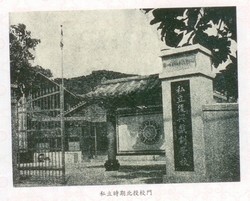
Fu Xin Opera School has cultivated plenty Chinese opera talents.
C. Military opera groups were launched and gradually established by the high ranking officials in the military.In early days, there were “Tiger Roaring,” “Flying Tiger,” and “Justice” and other some ten groups.Although manpower and financial power wer insufficient, and the scale were incomplete; however, after the consecutive establishment of “Da Peng” (in 1950), “Hei Guong” (in 1954), and “Lu Guong” (in 1958), the system were gradually steady, and organization on the track.They almost included most famous actresses then on Taiwan.This opened the opportunity of prosperity of military opera groups, and founded solid base for Taiwanese Chinese opera.
D. Privately founded by Zhen0Zu Wang, Fu Xin Opera School was commenced in 1957.Although still in the training stage, and just performed, but it had great and long impact to the cultivation of Taiwanese Chinese opera talents
II. Fully Blossom Development Period (1960 and 1970’s)
In this period, it was primarily to demonstrate the so many famous actors and so frequent performances of the military opera groups, and the talent cultivation of Fu Xin Opera School and small class of military opera groups as well.Due to the immense atmosphere and strong team of military opera group, it almost included most of the famous actresses on Taiwan.Later cultivated new actresses and the senior actresses coming from Mainland worked together for a long time regularly, and jointly opened a new page for Taiwanese Chinese opera stage.Besides comforting military, the major work of military opera groups via periodical public performance to present the art fruition.The social influential power can not be neglect able.
III. Innovation and Transformation Period (1980’s)
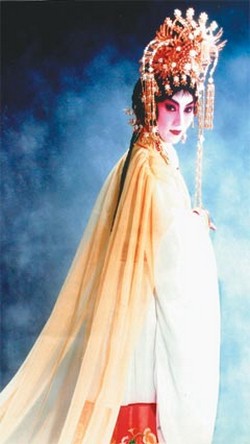
Founder of Yayin Group, Madam Xia-Zhuang Guo.
Due to the primary work in this period of Chinese opera coming from Mainland to Taiwan was to cultivate talents, but in terms of art, it was only “continuing of tradition”.Therefore, the presentation of Chinese opera did not change completely along the time.It did not speed its tempo, and the plot was still with the themes of loyalty and piety.Audience thus still primarily by the original lovers, and could not expand young group who represented the must of Chinese opera facing innovation.The innovation and transformation groups were primarily private opera groups as “Yayin Group” and “Contemporary Legend”.
A. Founded by Xia-Zhuang Guo in 1979, Yayin Group has opened the opportunity of Chinese opera change.It first led the atmosphere of “introducing notion of director, hiring of professional theatrical workers to design stage, and the cooperation of Chinese music orchestra and Chinese opera literary and martial setting”.This not only directly affected the performing style of then military opera group, but to the introducing of modern theater production direction to other kinds of opera (such as Taiwanese opera).And the progressive way of going to campus to do the demonstration and interpretation in promoting Chinese opera not only establish the later propaganda method of various opera groups, but rather forecasted the coming age of “media and marketing”.
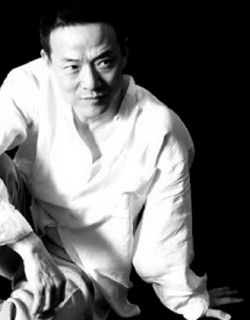
Xin-Guo Wu.
B. Founded by Xin-Guo Wu and his wife Xiu-Wei Lin in 1985, on the foundation of Yayin group, Contemporary Legend Theatre further raised the change issue of Chinese opera.From “Kingdom of Desire” to “Medea” to “Ostia”, the cities that Chinese opera may be performed are less and less, somewhat an innovation of blending classic and modern.In the meantime, the contact of Chinese opera and modern theater field also has the tendency as from its outer form (such as staging package) deeper down to the internalization as substantial content (like script and performing system).
Under the promotion of Yayin group and Contemporary Legend Theatre, in 1980’s, several civil opera groups established consecutively.These above-mentioned private opera groups had great impact to the main force of Chinese opera field, the military opera groups.Commenced from 1980’s,due to many actors and actresses of military opera groups participated in the performance of Yayin and Contemporary Legend, plus Cultural Affairs Commission launched “tradition and Innovation” theme of art activities for many consecutive years that led to the innovation trend, actors in the military opera groups no longer limited in the traditional fractional art, and walked into campus and society, or participated in the modern theater activities to change and breakthrough the adopting and performing style of opera.
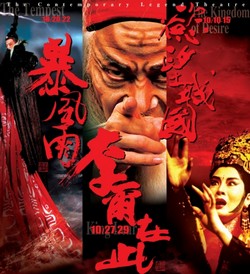
Contemporary Legend Theatre has great difference with the traditional Chinese opera in terms of writing and performing style of the opera.
IV. Interactive Influence of “Mainland Fever” and Localization (1990’s)
After the dismissing of the martial law, in 1992, art groups of Mainland consecutively came to Taiwan to perform.Interactions across the Straight were frequent that brought to Mainland Fever.Under this trend, it has clear influence on Taiwan’s Chinese opera field as follows:
A. Due to the offspring and students of fraction masters of Mainland came to Taiwan consecutively, the aesthetic experience of traditional fraction art was emphasized by audience.And the lyric aesthetic pleasure of traditional script also regained its value.National Guoguang Opera Company then cooperated with Mainland opera groups closely, and the performing style also mainly by keeping tradition.
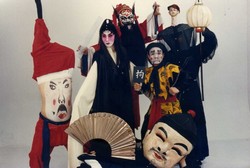
Yayin Group blended modern dance in the opera and innovated in costume.
B. For the past half century, the opera revolution experience on Mainland China has been brought to Taiwan, and intertwined with the innovation of civil opera groups of Taiwan in 1980’s. that formed plenty new operas that blending styles across the Straight.
C. The mainland fever has serious impact on Taiwanese Chinese opera actors.Although in terms of study and learning, it is easy to meet good teachers; however, in the mindset, they felt hesitated.Military opera groups finally faced joint and reorganization.In 1995, newly launched National Gouguang Opera Company therefore progressively promoted “localization of Chinese opera” plan to look for new path for Chinese opera actors, and seek for new positioning for Taiwanese Chinese opera.
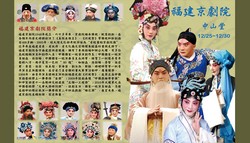
Interaction across the Straight brings new development to Chinese opera.
In the latter half of 1990’s , Chinese opera activities were concentrated among three groups: National Gouguang Opera Company, Fu Xin Opera Group (renamed as the opera group connected to “Taiwan College of Performing Arts”), and Taipei New Opera Company of the Koo’s Foundation with three different development directions.The Koo’s Cultural and Educational Foundation progressively produces of Chinese opera programs that led opera field across the Straight entered “depth interaction and substantial cooperation” ground.Major production new operas contain “originated from Mainland, and regenerated on Taiwan” feature.
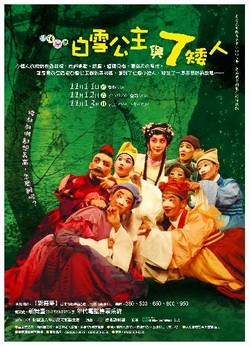
To attract children to enjoy, Chinese opera adopted “Seven Little Dwarfs in the Forest” story.
The Fu Xin Opera Group in recent years has created plenty new productions, some were cooperated with Mainland, others were representations of Taiwan local viewpoint, such as “Jin-Lian Pan,” “Authentic Autobiography of A-Q,” and “Lo-Sheng Gate”.Meanwhile, it has concrete fruition on the promotion of children’s Chinese opera, such as “Chang-E Flying to the Moon” and “Seven Little Dwarfs in the Forest”.National Gouguang Opera Company is based on the three military opera groups to joint and integrate, representing Chinese opera took off from military and political, back to art.It symbolized the localization of Chinese opera of Guoguang.
Reference: Gui-Zhe Su, Development of Chinese Opera and Taiwanese Opera Under the National Policy, Wen-She-Zhe Publisher, 2003. / sorted by the research team.
Source of Photos:
Art website of Zheng-Qiu Koo http://koo.theatre.nccu.edu.tw/pic/other/11_school.JPG
Yayin 329: Theatric World of Xia-Zhuang Guo http://www.yayin329.com/ensemble/1987-03-18.html
Contemporary Legend Theatre http://www.cyberstage.com.tw/troupe/troupe_page.asp?id=1114&ap=3
Culture Bureau of Taipei City Government http://express.culture.gov.tw/events_detail.php?ID=4403
Novel Hall http://www.novelhall.org.tw/saloon/plb_detail.asp?n=617
